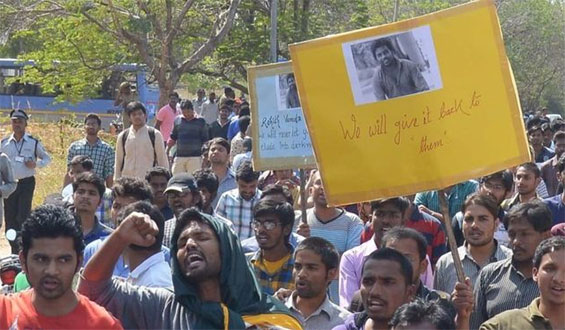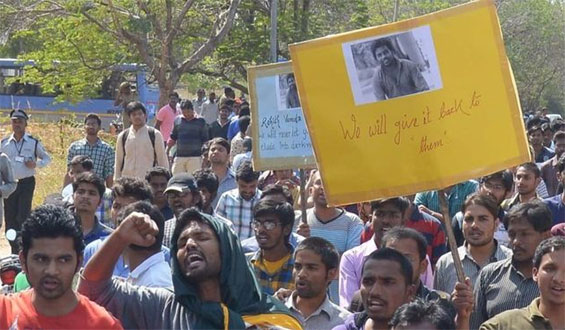
The suicide of a 26-year-old doctoral researcher at Hyderabad Central University this last week was followed by massive protests over the continuing caste stratification in Indian society.
Thousands of students boycotted their lectures and held a sit-in in the university, demanding the resignation of the University’s vice chancellor. The demonstrators received intensive support from students from Mumbai and New Delhi.
Police used water cannons to disperse them, and authorities confirmed the “preventive custody” of 37 people who were subsequently released without charges.
Rohith Vemula, a doctoral student in life sciences, was found hanging in his hostel room on January 17. He represented Dalit, the lowest caste in India’s religious hierarchy, explained Gautaman Bhaskaran of Asia Times. Vemula’s extremely poor family made a living by rearing pigs.
Samanth Subramanian of The National traced the reasons for the tragic death back to last summer. Back then, Vemula and four fellow Dalit students were active members of Ambedkar Students Association (ASA), an organization named after a Dalit national hero and a role model. The five friends participated in demonstrations against the death penalty of the proven terrorist Yakub Memon. The Dalits supposedly entered into a clash with a group of students from an upper caste, supporting the ruling Hindu nationalist party, said ABC News.
The junior labour minister wrote a letter to the university vice chancellor requiring sanctions against the five Dalit students. He also said that the school has become “a den of casteist, extremist, and antinational politics.”
Following the complaint, the Dalit students were suspended from school. The university also stopped paying out their financial aid. Their access to the library and all the university premises was restricted. The Dalit students were forced to leave their hostels and lived in a tent outside the school. They started a hunger strike soon after that.
University authorities initially cleared the Dalits in an inquiry into a fight. Subsequently, they cancelled the decision, and the students were suspended. Vemula himself wrote a letter to the vice chancellor saying:
“Supply a nice rope to the rooms of all Dalit students. We here are left with no easy exit, it seems. Hence, I request your highness to make preparations for the facility ‘EUTHANASIA’ for students like me. And I wish you and the campus rest in peace forever.”
A five-page note was found next to Vemula’s body. He did not blame anyone for his death and confirmed it was his decision to end his life.
As Deutsche Welle reported, the police were now investigating whether the actions of high profile politicians contributed to the death of Vemula. Ravneet Param, a fellow graduate student at Hyderabad University, commented in front of AFP news:
“This is not a suicide but a murder. There was too much pressure from the administration on the five students.”
If found guilty, the officials may face charges under a prevention of atrocities act meant to protect low-caste citizens who have experienced abuse and discrimination. Dalits, formerly known as “untouchables”, have been frequent victims of discrimination in India despite caste discrimination having been outlawed in 1947. Local authorities often treated such cases with low priority.
Rohith Vemula was not the first Dalit student to commit suicide, confirmed the National. In 2008 another student from Hyderabad University killed himself, and in 2012, a student in a top medical school hung himself after he experienced difficulties with the English language and no one helped him.




